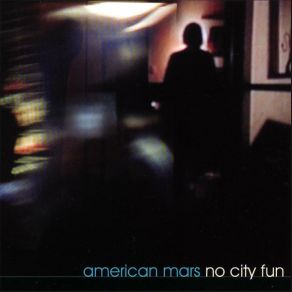No City Fun
Download links and information about No City Fun by American Mars. This album was released in 2001 and it belongs to Rock, Indie Rock, Country, Alternative Country, Alternative genres. It contains 11 tracks with total duration of 52:13 minutes.

|
|
|---|---|
| Artist: | American Mars |
| Release date: | 2001 |
| Genre: | Rock, Indie Rock, Country, Alternative Country, Alternative |
| Tracks: | 11 |
| Duration: | 52:13 |
| Buy it NOW at: | |
| Buy on iTunes $9.99 | |
Tracks
[Edit]| No. | Title | Length |
|---|---|---|
| 1. | Traces | 0:52 |
| 2. | No City Fun | 4:58 |
| 3. | If Monday Were Mine | 4:48 |
| 4. | Capitalist Riot | 5:47 |
| 5. | Loneliness Is Murder | 4:44 |
| 6. | Dirty Weather | 3:26 |
| 7. | Baby Kisses | 3:14 |
| 8. | In Remembrance of Her | 5:15 |
| 9. | Cold War | 3:54 |
| 10. | Over the Gun | 4:11 |
| 11. | Fingernail Moon | 11:04 |
Details
[Edit]When Detroit's American Mars released their debut album, Late, in 1997, they happened upon a music scene already too wrapped up in punk's past and techno's cynical yet futuristic soundscapes. Depending on who was singing, either Thomas Trimble or Karla Richardson, the band could sound like a vulnerable, hyperactive version of the Velvet Underground or like a less-frenetic version of Fire of Love-era Gun Club. But they were a pure rock & roll construct who reflected brightly on the city that birthed them. Four years later American Mars returned with a slew of different personnel and a new sound. Gone is the rage and the sense of urgency from their debut, and also gone (almost) is Richardson — though she appears here singing backup vocals on a number of cuts and even playing bass on one. But the band who created No City Fun is even more compelling, with songs of loss, grief, deep self-examination, and disillusionment that are architected with the guitar as their cornerstone. Trimble plays all kinds of guitars here, the ones that whisper, the ones that scream, the ones that wail, the ones that shout, the ones that crunch, and even the ones that lilt. Veteran Detroit producer Dave Feeny accompanies him here on pedal steel — which becomes the atmospheric thread that links these songs and their disparate emotions and scenery and vocals; he is his partner in loneliness and wonder. Bassist Garth Girard has officially joined the touring outfit, as has drummer Mike Popovich; they make several appearances on the record as well.
The solid steel string whine of Feeny's axe on "If Monday Were Mine" gives a lay of the land with its bittersweet, lost wistfulness for something previous, something simpler, something a wish can never really bring home: the end to longing. "Capitalist Riot" is the pop song as elegy. With its textured and layered strings winding around each other and laying a bed of glissando shapes and timbral elegance, it offers bereavement as recollection and an empty lavender evening sky as the sum total of acceptance. Think of the middle period work of Joe Henry and you've got an idea. And these songs beg a question for Trimble as a writer (as a poet, really), and that is: where do these songs point if not to the margin where personal experience meets the collective by means of Americana-based rock & roll? These songs are rooted in a poetry that bleeds communal experience as one shared by death, disappointment, survival, resolve, resignation, and transcendence.
Where it all gets blurry and then so clear that it's frightening is in Trimble's account of Mary Magdalene on "In Remembrance of Her." As Jesus sings (or is it the songwriter?), the guitars falter, plodding the frame of the scene as the familiar scene of Magdalene anointing Christ's feet with oil and washing them with her hair. Pedal steel coming from the desert washes down inside the mix; there's a pair of bass players crossing in the middle of the body of the tune and Trimble is switching back and forth between images from the present and from the Bible, speaking in that world-weary voice of tolerance and heartbreak only Christ could sing with. The track splits at the seams and we hear him say, "But every night I say my prayers/In remembrance of her/Her eyes/They don't even wait for night/They don't even wait for life." This is the sound of Holy Saturday as it becomes flesh in rock & roll, the sound of a body interred in a tomb whose spirit can feel the bleeding heart of love and desire that weeps outside...waiting. On "Cold War" the ghosts of Ian Curtis and Joy Division waft through the sewer grates and come up for a look around at the barren landscape of relationships that remain tied but unwound by pressures and spirits far too large to name or even conceive. But there is straight-ahead rock & roll on No City Fun as well, such as on "Over the Gun," with its ravaged-heart lust and resignation to the costly ache of betrayal. With its screaming middle and overdriven feedback and steel whine, it's as if country music finally found its place in the postmodern world and the grain in Trimble's voice reveals that the entire universe has cracked open and is gushing its brokenness from the center of a guy with an electric guitar.
There isn't a weak moment on No City Fun. American Mars, during the years between recordings, has become a leaner, more confusing, and profound rock & roll band by aiming for the lyrical places where only ghosts dare to whisper and the musical spaces where past, present, and future bleed into one another as the timelessness of one endless twilight sky.